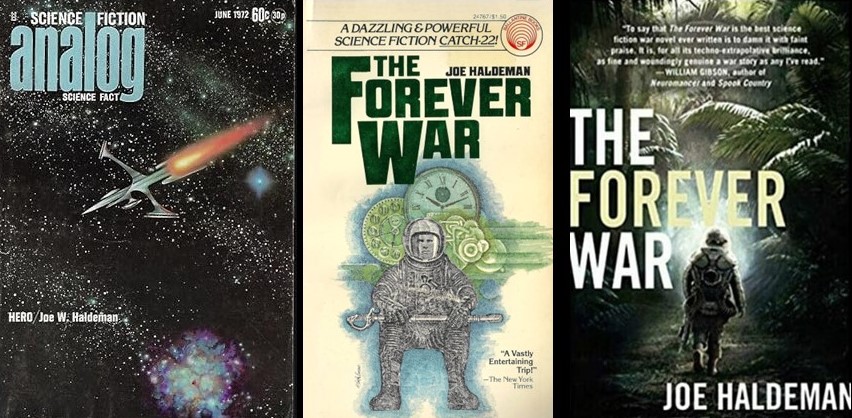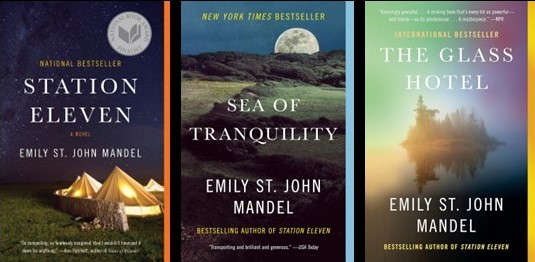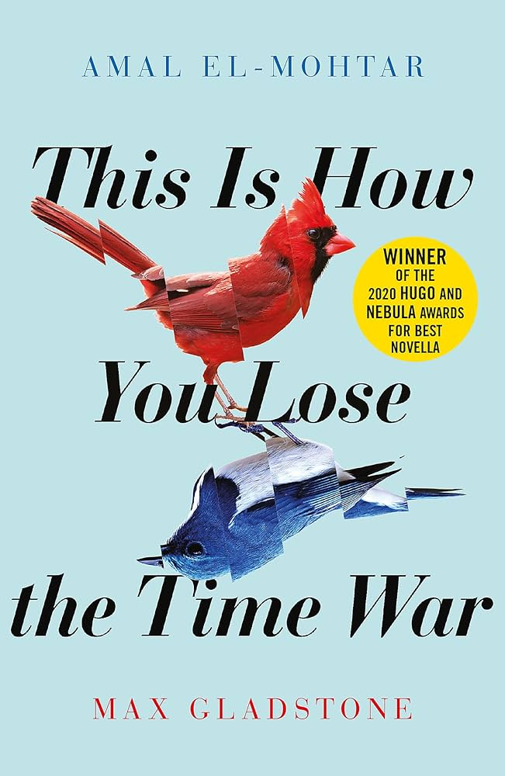
Can you find the standalone science-fiction novel?
Last week’s post concluded by asking, “Do you have any recent stand-alone sf books to recommend?”
Alas, it seems coming up with such recommendations is not as easy as it sounds.
Consider, for example, the books pictured above–seven titles I’ve either read or reread in preparation for a panel at the upcoming Confluence Science Fiction Convention.
Here’s the panel’s description from the con’s program book:
- Not Everything Is a Series: The Best Stand-Alone Novels of the Last Decade.
- It seems that every book is part of a series, but there are still good stand-alone novels being published. The panelists discuss some of their favorites.
The search begins.
Let’s consider the candidates.
First up: Joe Haldeman’s The Forever War. Originally a series of novellas published in Analog Magazine in the early 70s, it saw its first iteration as a standalone novel in 1974 and went on to win the Nebula, Hugo, and Locus Awards the following year.

I first read Haldeman’s book when it came out in 1974, in a paperback edition that’s markedly different from the book I’m reading now. You might say that’s because I’ve changed, and you’d be partly correct. One’s view of a book can change over time. But in this case, the book has changed too.
The latest edition from Thomas Dunne Books contains a novella-length section that did not appear in the original paperback release, and the result is a story significantly different from the one I read in the 70s.
And beyond that, although The Forever War was first released as a standalone novel, it has since become part of a series with the publications of Forever Peace (1997) and Forever Free (1999). So, although the expanded edition of The Forever War might arguably be a newer work, it’s no longer a standalone.
A proliferation of sequels.
Such is also the case with Emily St. John Mandel’s Station Eleven, which was a standalone work when first released in 2014. It went on to win the Arthur C. Clarke Award for best science fiction novel, was named one of the 100 Best Books of the 21st Century by The New York Times, and was recently produced as a limited series on Max. But it’s no longer a standalone novel because its success has since spawned two follow-ups: The Glass Hotel (2021) and Sea of Tranquility (2023).

And then there’s David Mitchell’s wonderfully weird Slade House, which I read before realizing it was a sequel to The Bone Clocks.
As for the other books pictured atop this post, I’m Thinking of Ending Things, The Serial Killer’s Son Takes a Wife, The Ritual of Illusion, and The Anomaly all appear to be (as of this writing) non-series books. However, despite its surreal qualities, Ending Things isn’t really science fiction. Nor is Serial Killer’s Son, which is one of my favorite novels of the past few years. (See my interview with author Michael Libling here.)
Ritual, which I reviewed here when I first read it a few years back, is likewise terrific, but it’s more horror than science fiction. And it’s a bit short to be considered a novel, although its tour deforce presentation makes it seem far more expansive than its page count suggests. Check it out here if you’d like to see what I mean. You’ll be glad you did.
The Anomaly.
As it turns out, of the seven titles I initially considered discussing at the upcoming panel, only The Anomaly qualifies as a recent work of non-series science fiction, which I suppose makes it what its title suggests … an anomaly.

In addition, Hervé Le Tellier’s book is easily one of the best novels of the past decade. And I’m not alone in that assessment. The Washington Post called it an “elegant mix of science fiction and metaphysical mystery,” and the New York Times named it” the best book of the year” upon its initial release in 2021.
It also won The Arthur C. Clark Award for best science fiction novel. So … even though it was not marketed as sf, it clearly qualifies.
But certainly, there are other candidates, right?
Responding to my call for recommended books, author and educator Jonathan Cassie reached out on social media to recommend This is How You Lose the Time War by Amal El-Mohtar and Max Gladstone.

It won both the Nebula and Hugo Awards, and–at least for now–it appears to be a standalone work.
That’s the challenge in finding a non-series novel. Success leads to duplication. Books and films that do well tend to generate follow-ups.
The search goes on.
In any event, the quest for great nonseries sf novels will continue as I join the panel discussion at Confluence later this month.
I’ll endeavor to post a follow-up list based on that panel’s recommendations. In the meantime, if you have any additional titles to share, please pass them along in a comment or by reaching out via the social media buttons at the bottom of this page.
Until then, keep reading … and watch out for sequels.

Leave a Reply